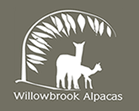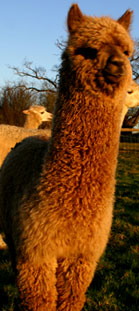Routine Care
Alpacas suffer few health problems and are very hardy. Unlike sheep they don't suffer from foot rot problems, and don't require dipping.
They need to be checked at least once a day and preferably twice as they are very inquisitive animals. This is usually accomplished when feeding takes place. They do however give little indication of being unwell until rather poorly. It is therefore useful to regularly body score animals (as loss of weight may be a first sign), when they are heavily fleeced to check condition. This is quick and simple and entails a simple assessment of how well fleshed an individual is.
Routine vaccinations are used to protect against clostridial diseases, but these are only carried out at one month old, two months of age and then at six monthly intervals. An annual booster against blue tongue (BTV8) also used to be administered in the springtime before midges become active (February, March, April). However, this is currently no longer a requirement as Britain was declared blue tongue free on 5th July 2011.
Alpacas are very clean animals that defecate in one or more isolated sites. They don't graze around these areas and therefore it is usually sufficient to worm at 6 monthly intervals. Some breeders have regular dung samples taken to be checked for worm presence or absence by their vet; only then do they worm if necessary. We compost our alpaca dung with our cattle manure. This is then spread back onto our land which provides an excellent and natural fertiliser. Alternatively, you can collect it for use as a garden compost (maybe another means to produce a financial return?!).
When they are growing, the cria benefit from a vitamin supplement that contains vitamin D. This prevents rickets, which is caused by a lack of sunlight in our country.
Alpacas need shearing once a year, usually in May, before the weather gets excessively hot. Heavily fleeced animals can suffer from heat stoke so it is important not to leave this task too late into the season. Shearing is painless and quick, but do book your shearer well in advance of the season, as they get booked up very quickly.
An alpaca's foot consists of a pad with two toes and nails. These toenails need trimming from time to time, but this can be done easily with a sharp pair of cutters.
They travel well if they need to be moved, and will generally lie down. They can be transported by cattle trailer, horsebox or any enclosed trailer. They shouldn't be tethered as this could be dangerous, and the floor should be soft to prevent them from grazing their legs; old carpet works well.
Record keeping is essential to maintain the health of your animals. It only needs to be simple, but should include details of any medicines given including the date when these were administered.
If all of the above sounds daunting, it really isn't as bad or time consuming as it may first appear. For each animal the time involved is minimal. However, if you choose to keep alpacas, above all, enjoy them! They are extremely intelligent, they learn quickly and adapt well. The more you put into them, the more you will get back.
| 
